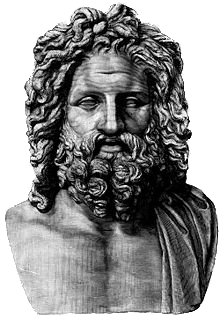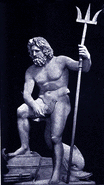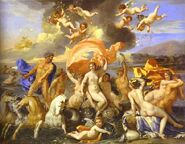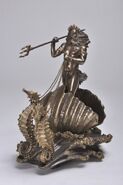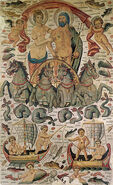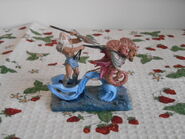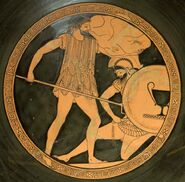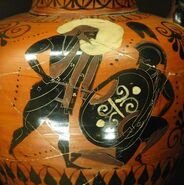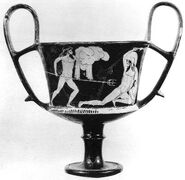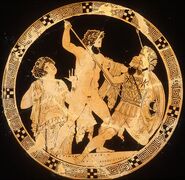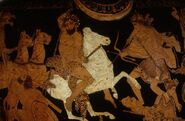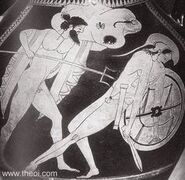Poseidon (Ποσειδων) is the greek god of the sea, earthquakes, droughts, floods, water, aquatic creatures, marine weather and horses. He held sway over the seas and waters, and is particularly known for causing tempests. Poseidon is also the patron of seafaring. One of his cult titles, Enosichthon, means "earth shaker", referring to his role in causing earthquakes. His symbols are the trident, with which he raises the waves and causes tides, and the bull, which is as aggressive as him. He is also called the "tamer of horses", as he created the first horse from the crests of the waves. His Roman counterpart is Neptune.
Poseidon was the child of Kronos and Rhea, and brother to Zeus and Hades. According to some folklore, he was saved by his mother Rhea, who concealed him among a flock of lambs and pretended to have given birth to a colt, which was devoured by Kronos.
Myths
Immediately after Poseidon was born he was eaten whole by his father, Kronos. When Zeus was born he tricked Kronos into vomiting up his siblings and Poseidon and his other four trapped siblings were freed from their father's stomach. They started a war called the Titanomachy which lasted ten years. After the battle the three siblings; Zeus, Poseidon and Hades, drew lots to see who would rule each of Kronos' three kingdom's. The Sky, the seas, and the Underworld. Hades got the Underworld, Zeus got the sky and Ruler of Olympus, and Poseidon got the seas.
Patron God of Athens:
There once came a time in Ancient Greece when the first king of Athens, Cecrops, who was half person and half snake, had to find a patron deity for the city state of Athens .
The two Olympian gods who were particularly interested in the patronage were Poseidon, the god of the Seas and Athena, the goddess of Wisdom and Skill. They presented themselves in front of Cecrops and Cecrops asked from them to offer a gift truly valuable for Athens. Poseidon came first: he struck the earth powerfully and created a well with his trident. Immediately, streaming water shot forth, but the water turned out to be salty and not very useful for the population. Next, it was the turn of goddess Athena. Athena stepped forward, struck her spear into the ground and then she knelt and planted an olive branch in it. This way she created an olive tree, as a symbolization of peace and prosperity on earth. Cecrops was very impressed by Athena’s gift. So he chose Athena to lay claim of the city of Athens and the city was named after her. God Poseidon, however, was not pleased with the decision of Cecrops and cursed the city of Athens to never have enough water from then on. After that, it is said that a major problem of water shortage started in Athens, which continues to this day.
Poseidon and Medusa
Poseidon desperately desired Medusa, a virgin priestess of Athena. In a moment of raw passion he chased after her. Medusa escaped Poseidon's embrace, and ran to Athena's temple to beg for help. Poseidon found the poor girl and raped Medusa on the floor of Athena's temple of worship. When Athena discovered this, she angrily turned her priestess Medusa into a monster for her losing her purity. Years later, when Perseus slayed Medusa and their son the giant Chrysaor and the winged horse (Pegasus) were born from her blood.
The Cretan Bull
When Minos, the King of Crete wanted to prove that he was the rightful king, he told the Cretans that he was able to make a majestic white bull appear from the sea. Minos prayed to the gods to help him perform this feat and he would sacrifice the bull in return. Poseidon heard this prayer and made a pure white bull appear from the waves. After Minos became king, instead of sacrificing the bull like he promised, he tried to sacrifice his other bulls and kept the white bull as a pet.This greatly angered Poseidon, who, with the help of Aphrodite, made Minos's wife, Pasiphae, fall in love with the bull, leading to the birth of the Minotaur.As his seventh labor, Heracles wrestled the Cretan Bull until it tired out, then brought it before his cousin, King Eurystheus.
The Walls Of Troy
Poseidon and Apollo once convinced the other gods to overthrow Zeus as he wasn't doing a good job ruling Olympus. They tied him up while he was sleeping and nearly succeeded, but at the last moment, the sea nymph Thetis along with the Hekatonkheire, Briares, freed Zeus. As a punishment, Apollo and Poseidon had to swear a solemn oath to build the famous Walls of Troy for King Laomedon.
Gigantomachy
In the Giant War, the chthonic sons of Gaia invaded Poseidon's kingdom, but were driven back to the surface. The gods wasted no time slaying the Giants. Poseidon chased the giant, Polybotes to the boundary of the Mediterranean, and hurled an island at him, crushing the poor giant to death.

The Return of Poseidon
Marriage to Amphitrite
Before Poseidon was married to Amphitrite he was in love with a sea nymph with Thetis. But once he heard that there was a prophecy that Thetis' son would be more powerful than his father he disliked her and fell in love with her sister Amphitrite. But Amphitrite disliked Poseidon because he was moody and a bully. But the crafty god Delphinus persuaded Amphitrite to marry him and she finally did. Poseidon was so grateful to Delphin (Delphinus) that he made him a constellation, Dolphin, in the sky
Illiad and the Odyssey
In the Illiad, Poseidon conspires with Hera to make Zeus fall asleep. He nearly exposes the Underworld to the Sun. Poseidon impersonates some Greek Warriors, roars like ten thousand warriors and pushes the Trojans back, until he is summoned by Zeus. Poseidon later appears as a storyteller in the war.
In the Odyssey, Poseidon is the main antagonist, responsible for Odysseus's ten years at the sea. Poseidon hated Odysseus for his arrogance, and when the hero blinds his Cyclops son, Polyphemus, the god decides to take revenge on him.
Poseidon wrecks Odysseus's ships and maroons him on dangerous islands. He slowly kills all of Odysseus's crew via accidents and monsters. Odysseus survives alone and is forced to spend seven years on Calypso's island. Poseidon once again plays with Odysseus's life, until the hero reaches home. Later Odysseus begs forgiveness from Poseidon, which the god pardons him.
Personality
Poseidon does not interact with mortals much, but he is also known for his numerous affairs with beautiful women. He is dreaded by humans and gods alike. Poseidon can be very ruthless, moody and vengeful. He hated being a subservient to his much more prominent brother, Zeus, and always looked for ways to upstage him. He does not like Athena either, for her arrogance, and disdains the goddess. Like his brother, Hades, Poseidon is also a lonesome god, hardly anyone visiting his realm.
Poseidon shares many negative traits with his father, Kronos and they are much more prominent in him, than in any other god. Sometimes he is considered a villain.
Importance, Functions and Abilities
As the god of the oceans, Poseidon was one of the three most powerful Greek gods, alongside his brothers, Zeus and Hades. Like his brothers, Poseidon can control the earth. Poseidon was a dreaded god among the Greeks, and rarely interacted with mortals. The Greeks depended on the sea to carry out trade and earn their livelihood out of fishing, and prayed to Poseidon. The powerful god was also one of the many deities who could make lands fertile.
If Poseidon was pleased, he would bless sailors with a safe voyage in the sea, make the agricultural lands fertile, provide abundant supply of freshwater or would allow trade to flourish. But if someone (like Odysseus) offended Poseidon, the god's vengeance knew no bounds. He would send powerful storms, winds and floods to kill thousands of people, wreck entire ships on islands or sink them beneath the sea; raze entire cities with devastating earthquakes or send terrible sea monsters to maraud cities. Poseidon was also known to cause mental illnesses from time to time, to punish people. When King Alcinous offended Poseidon, he cut off the Phaeacian's access to the sea, and trapped them in between steep mountains he had caused to rise.
Poseidon lived in an underwater palace and as such, ruled over the denizens of his watery world. He controlled every aspect of the oceans and aquatic regions. Poseidon was more powerful than other sea deities combined and the latter were his subordinates. Poseidon posted one of them, Proteus to the icy regions in the north, to rule over these lands.
He is also the creator of horses. Before the horse, Poseidon created the hippo, the camel, the giraffe and the zebra, then refined the shape to create the first horses, out of sea waves.
He fought for the patronship of many cities, mainly Athens. But when the people chose Athena, Poseidon unleashed a powerful flood. Since then, Athenians gave equal worship to Poseidon. The god once again lost control of Argos against Hera, when she won by one vote. Poseidon retaliated by massacring the local river gods, flooding the entire city and subjecting to drought. Since then, the Greeks stripped women of their right to vote. Poseidon was a patron god to majority of the Greek cities and ports, and thus earned the title of "Protector of Greece".
Unlike other gods, Poseidon enjoyed a greater level of autonomy and Zeus rarely excercised control over him. Poseidon, however, did not possess the tremendous authority over the lesser Olympians, gods and humans unlike Zeus (ex: controlling their powers, taking and granting immortality, punishing them etc), and in that respect, remained inferior to him.
Attributes
Parents
Spouse and Other Lovers
- Aba (a nymph)
- Aethra
- Agamede
- Alistra
- Alkyone
- Alope
- Amphitrite (Poseidon's Wife)
- Amphimedusa, Danaid
- Amymone
- Aphrodite
- Arene
- Arne (Melanippe)
- Askre
- Astydameia , daughter of Phorbas
- Astypalaea
- Beroe (daughter of Aphrodite)
- Boudeia (Bouzyge)
- Demeter
- Diopatra, nymph of Mount Othrys
- Erythras
- Euryale, daughter of Minos
- Eurykyda
- Eurynome (Eurymede), daughter of Nisos
- Euryte / Bathykleia
- Gaea
- Halia
- Harpale / Skamandrodike / Kalyke
- Helle
- Hermippe
- Hippothoe
- Iphimedeia
- Kaenis
- Kalkhinia
- Kanake
- Kelaino (Pleiad or daughter of Ergeus)
- Kelaino, Danaid
- Kerebia
- Keroessa
- Kleodora
- Khione
- Khrysogeneia
- Korkyra, nymph
- Koronis
- Taphius
- Laodike
- Larissa
- Leis, daughter of Orus
- Libya
- Lysianassa/Anippe
- Mekionike/ Europa, daughter of Tityos
- Medusa
- Melantheia, daughter of Alpheus
- Melantho (daughter of Deukalion)
- Melia
- Melissa, daughter of Epidamnus
- Mestra
- Mideia
- Molione
- Mytilene
- Oenope
- Olbia, nymph
- Ossa
- Peirene
- Periboea
- Pero, nymph / Kelousa, nymph
- Pitane, nymph / Lena
- Rhodope, daughter of Strymon
- Salamis, daughter of Asopus
- Satyria, nymph of Taras
- Syme
- Themisto
- Theophane
- Thyia
- Tyro
- Thoosa
- Unknown Consort (Mother Of Amphimarus)
- Unknown Consort (Mother Of Amyrus, eponym of a river in Thessaly)
- Unknown Consort (Mother Of Astraeus and Alcippe of Mysia)
- Unknown Consort (Mother Of Kalaurus)
- Unknown Consort (Mother Of Korynetes) (possibly)
- Unknown Consort (Mother Of Kromus) (eponym of Krommyon)
- Unknown Consort (Mother Of Geren), eponym of a town or village Geren on Lesbos
- Unknown Consort (Mother Of Dikaeus), eponym of Dikaea, a city in Thrace
- Unknown Consort (Mother Of Euseirus (father of Kerambus)
- Unknown Consort (Mother Of Ialebion (Alebion) and Derkynus (Bergion) of Liguria
- Unknown Consort (Mother Of Laestrygon), eponym of the Laestrygonians
- Unknown Consort (Mother Of Lamus), king of the Laestrygonians
- Unknown Consort (Mother Of Lilaea (possibly)
- Unknown Consort (Mother Of Messapus)
- Unknown Consort (Mother Of Onkhestus)
- Unknown Consort (Mother Of Ourea)
- Unknown Consort (Mother Of Palaestinus)
- Unknown Consort (Mother Of Phorbas of Acarnania)
- Unknown Consort (Mother Of Poltys)
- Unknown Consort (Mother Of Proteus)
- Unknown Consort (Mother Of Prokrustes)
- Unknown Consort (Mother Of Sarpedon of Ainos)
- Unknown Consort (Mother Of Skeiron)
- Unknown Consort (Mother Of Syleus)
- Unknown Consort (Mother Of Taenarus) (possibly)
- Unknown Consort (Mother Of Amyrus), (eponym of a river in Thessaly)
- Unknown Consort (Mother Of Astraeus and Alcippe of Mysia)
- Unknown Consort (Mother Of Kalaurus)
- Unknown Consort (Mother Of Korynetes) (possibly)
- Unknown Consort (Mother Of Kromus) (eponym of Krommyon)
- Unknown Consort (Mother Of Geren) (eponym of a town or village Geren on Lesbos)
- Unknown Consort (Mother Of Dikaeus), (eponym of Dikaea, a city in Thrace)
- Unknown Consort (Mother Of Euseirus), (father of Kerambus)
- Unknown Consort (Mother Of Ialebion (Alebion) and Derkynus (Bergion) of Liguria)
- Unknown Consort (Mother Of Laestrygon), (eponym of the Laestrygonians)
- Unknown Consort (Mother Of Lamus, king of the Laestrygonians)
- Unknown Consort (Mother Of Lilaea) (possibly)
- Unknown Consort (Mother Of Messapus)
- Unknown Consort (Mother Of Onkhestus)
- Unknown Consort (Mother Of Ourea)
- Unknown Consort (Mother Of Palaestinus)
- Unknown Consort (Mother Of Phorbas of Acarnania)
- Unknown Consort (Mother Of Poltys)
- Unknown Consort (Mother Of Proteus)
- Unknown Consort (Mother Of Prokrustes)
- Unknown Consort (Mother Of Sarpedon of Ainos)
- Unknown Consort (Mother Of Skeiron)
- Unknown Consort (Mother Of Syleus)
- Unknown Consort (Mother Of Taenarus) (possibly)
Male lovers
Nerites Pelops Patroclus
Children
- Abas
- Aeolus
- Aethusa
- Agelus
- Agenor
- Akhaeus
- Alcippe of Mysia
- Almops
- Aloeus
- Altephus
- Amphiktyon (Mother of Kerkyon)
- Amphimarus
- Amykus
- Amyrus, eponym of a river in Thessaly
- Ankaeus
- Antaeus
- Anthas
- Arion
- Asopus (possibly)
- Aspledon
- Astakus
- Astraeus
- Athos
- Bellerophon (possibly)
- Belus
- Benthesikyme
- Boeotus
- Busiris
- Byzas
- Derkynus (Bergion) of Liguria
- Despoina
- Diktys
- Dikaeus, eponym of Dikaea, a city in Thrace
- Daimones Proseoous (by Halia)
- Delphus
- Derkynus (sometimes known as Bergion) of Liguria
- Dikaeus, eponym of Dikaea, a city in Thrace
- Diktys
- Dyrrhakhius
- Edonus
- Eleius
- Ephialtes (Aloadae)
- Epopeus
- Erginus
Ergiskus
- Euadne
- Eumolpus
- Euphemus, Argonaut
- Eurypylus of Kyrene
- Eurypylus of Kos
- Euseirus (father of Kerambus)
- Geren, eponym of a town or village Geren on Lesbos
- Halirrhothius
- Herophile the Sibyl
- Hippothoon
- Hopleus
- Hyrieus
- Hyperenor / Hyperes
- Ialebion (Sometimes Called Alebion) of Liguria
- Ialysus
- Idas (possibly)
- Irene
- Kalaurus
- Kameirus
- Kaukon
- Kelaenus
- Kenkhrias
- Kerkyon
- Kharibdis
- Khios
- Khrysaor
- Khryses, father of Minyas
- Khrysomallus
- Khthonius
- Korynetes (possibly)
- Kromus (eponym of Krommyon)
- Krysomallos
- Kykhreus
- Kyknus
- Kymopoleia
- Lelex
- Lekhes
- Laestrygon, eponym of the Laestrygonians
- Lamus, king of the Laestrygonians
- Leukon (possibly)
- Lindus
- Lilaea (possibly)
- Lykaon
- Lykus
- Malinia
- Megareus of Onchestus (possibly)
- Melas
- Messapus
- Minyas (possibly)
- The Molionides
- Mygdon
- Myton
- Nauplios
- Nausithous
- Neleus
- Nireus
- Nykteus
- Oeoklus
- Ogygus
- Onkhestus
- Orion (possibly)
- Otus (Aloadae)
- Ourea
- Pegasus
- Paion
- Palaestinus
- Parnassus
- Pelasgus
- Pelias
- Peratus
- Phaeax
- Phineus
- Phokus
- Phorbas of Akarnania
- Poltys
- Polydektes
- Polyphemus
- Prokrustes
- Proteus
- Pythius
- Rhode
- Rhodos (possibly)
- Sarpedon of Ainos
- Sithon (possibly)
- Skeiron
- Syleus
- Taenarus (possibly)
- Taras (eponym of the location)
- Theseus
- Torone
- Triopas
- Triton
Siblings
Friends
Enemies
Athena, The Trojans, and Odysseus.
Temples
- Because Poseidon's temple's have always been built near the sea or ocean they have been weathered away and are not in good shape today. The best temple that is still mostly intact is in Cape Sounion that has a view of the Aegean Sea.
Appearance
Poseidon is depicted as a tall, muscular man. He is either shown as a middle aged man with long hair and black beard, or as an old man with greyish white hair.
Gallery
Gigatomachy Gallery
Trivia
- Although Poseidon is the Lord of the Oceans, his name means the Lord of the Earth.
- Horses, Bulls, Rams and all marine life are Poseidon's sacred animals. Ash trees and White Pine trees are his sacred trees.
- Poseidon once convinced the other gods to overthrow Zeus and almost succeeded because the hecatonchire Briareus saved him.
- Poseidon was the god who had the most amount of lovers.
| v • e | Olympian Gods | |
| Olympians : | Aphrodite • Apollo • Ares • Artemis • Athena • Demeter • Dionysus • Hades • Hephaistos • Hera • Hermes • Hestia • Poseidon • Zeus | |
| Related Articles : | Mount Olympus • Protogenoi • Titans • Gigantes • Demigods | |
